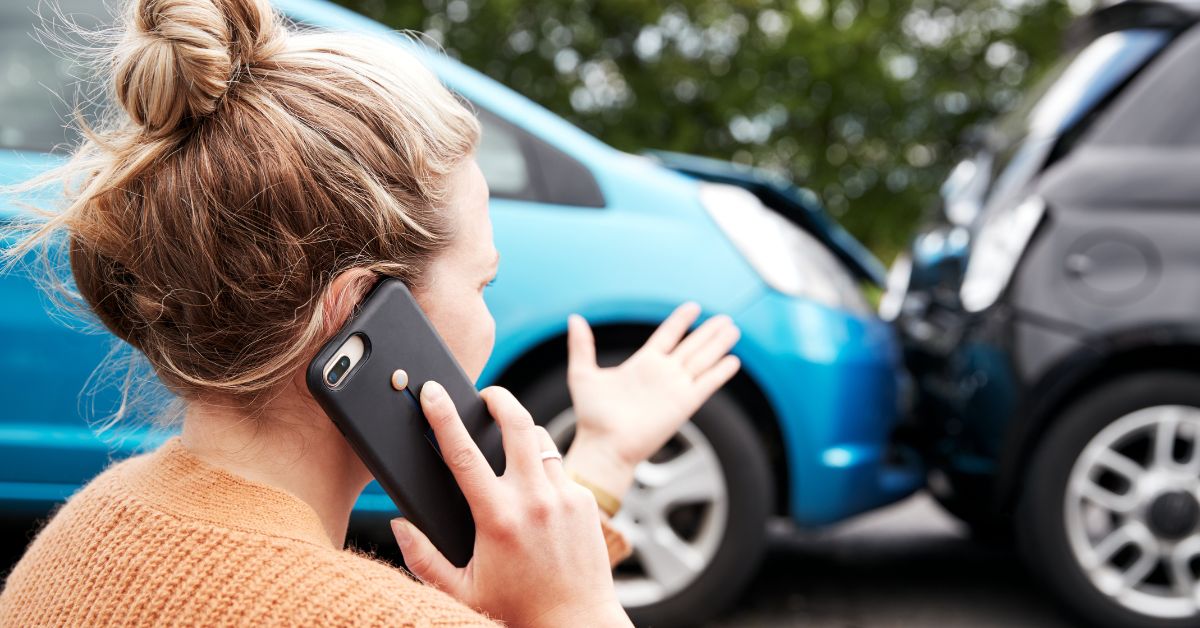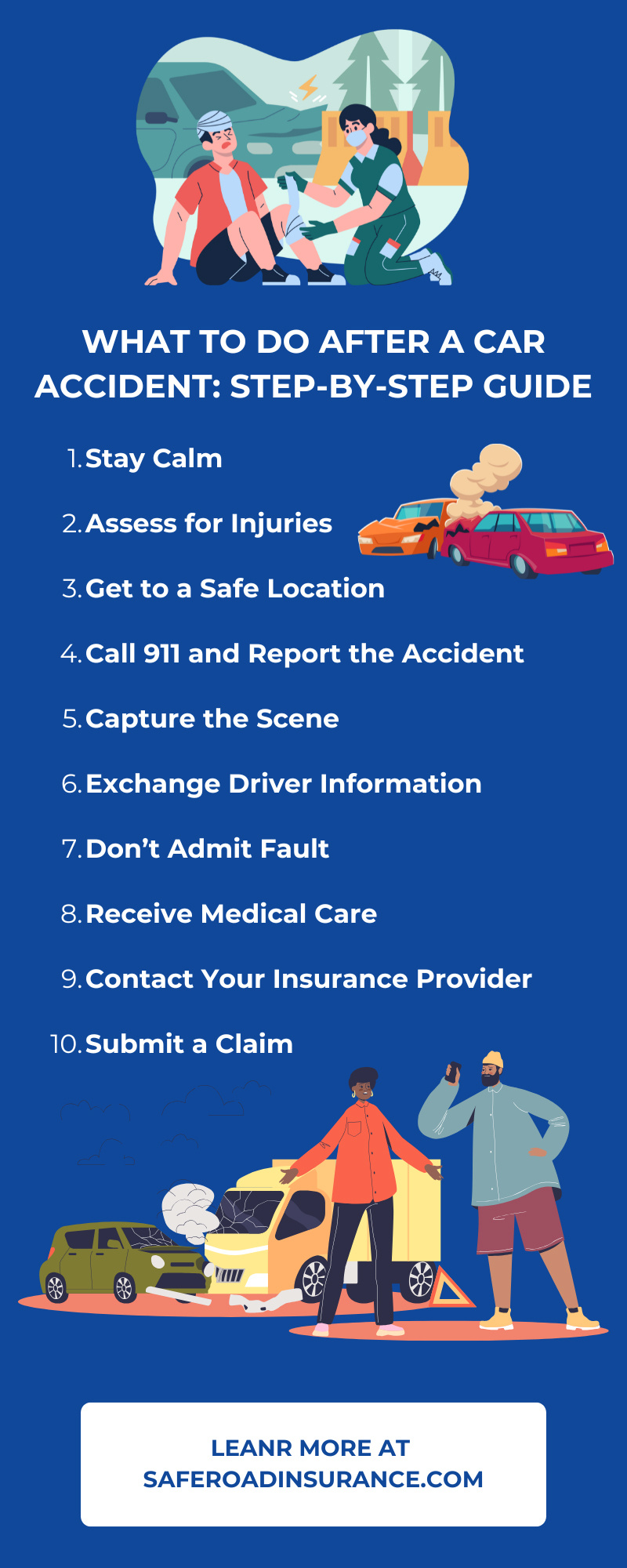
The chaos in the immediate aftermath of a vehicular accident can make it difficult to think clearly and take appropriate action. It’s common to feel overwhelmed and disoriented, but remaining calm, focusing on your well-being, and following the law will help you effectively navigate the situation and make informed decisions.
After all, taking the proper steps can impact our safety and ability to receive proper compensation for damages and injuries. This step-by-step guide will outline everything you need to do after a car accident to help you during such a challenging time.
Stay Calm
The first thing to remember after a car accident is to stay calm. Take a few deep breaths and ground yourself. You’ll find you can manage the situation more efficiently in this mindset. Your actions impact the immediate aftermath of a vehicle crash. Maintaining composure allows you to complete the following steps with a level head while keeping yourself and your passengers safe.
Assess for Injuries
After taking a moment to regain your composure, assess yourself and others for injuries. Accident-related injuries aren’t always immediately apparent, as adrenaline can mask pain. You may still need medical attention even if you feel fine right after the accident.
If you can move without pain and the scene is safe, ask if the occupants of the other vehicle and any pedestrians involved need medical assistance. Let emergency services reach them first if there’s ongoing traffic or a dangerous scene on the road.
Get to a Safe Location
If possible, move your vehicle to a safe location on the side of the road or in a nearby parking lot. Turn on your hazard lights to alert other drivers of the situation. Moving your vehicle out of the way of traffic can prevent further accidents and keep more people safe.
If you can’t drive your vehicle due to the damage it sustained, stay inside with your seatbelt fastened until help arrives. Exiting a vehicle on a busy road can be dangerous, so only get out if it’s safe to do so.
Call 911 and Report the Accident
Dial 911 to report the accident regardless of the severity. Be clear and concise about your location and the nature of the accident when speaking to the dispatcher. Provide all necessary details, such as the number of vehicles involved and if medical attention is required. The police report will provide an objective account of what happened, which can be valuable when filing an insurance claim.
Capture the Scene
While waiting for the authorities, document the accident scene if you’re able. If you can’t, ask an uninjured passenger to do so. Take photos and videos from various angles. Capture the damage to all vehicles involved, any visible injuries you or your passengers sustained, and any relevant road conditions and traffic signs.
Photos can serve as crucial evidence if disputes arise about what happened, but that’s not all. Visual evidence can also support your insurance claim by providing a record of the damage and the scene. Thorough documentation strengthens your position in legal proceedings and ensures a fair resolution with your insurance provider, so don’t skip this step.
Exchange Driver Information
Exchange information with the other driver once everyone is safely away from traffic, obtaining their name, address, phone number, insurance company, and policy number. Also, take note of their vehicle’s make, model, and license plate number.
Additionally, request contact details of any witnesses to the accident. Their accounts can provide supporting evidence for your version of events. Gathering this information will help you file insurance claims.
Don’t Admit Fault
Be mindful of what you say when speaking to the other involved parties and law enforcement. Avoid admitting fault or making statements that could be interpreted as an admission of guilt. Assume that any statement toward a law enforcement officer, the other driver, or a witness could be used against you despite the details of the accident.
Stick to the facts and leave the determination of fault to the authorities and insurance companies. Remain neutral and focused on exchanging information and confirming everyone’s safety.
Receive Medical Care
Early detection of hidden injuries can prevent complications. Remember, some injuries may not immediately present symptoms. A medical professional can identify and treat these injuries before they become serious. Visit a doctor as soon as possible and keep records of all medical visits and treatments, as they’ll be vital for insurance claims and any legal matters that may arise.
Contact Your Insurance Provider
After taking care of immediate concerns, contact your insurance provider to report the accident. Promptly reporting ensures a smoother claims process. Your insurance company will guide you through the next steps and explain the claims process and what you need to do to get your car repaired or replaced.
It’s advisable not to speak with the other party’s insurance provider without consulting an attorney. The insurance provider may misconstrue your words or get you to admit information that reduces your chances of receiving fair compensation.
Submit a Claim
File a claim with your insurance company while recovering from the accident. Provide them with all the information and documentation of the accident you gathered at the scene and in the following days. A claims adjuster will assess the damage and work with you to resolve the claim as quickly as possible.
Stay proactive and follow up regularly so your claim is efficiently processed. The sooner you file, the sooner you can move forward. Based on your policy type, your insurance provider will either pay you a sum for repairs or directly handle it themselves.
Getting in an auto accident is undoubtedly stressful, but knowing what actions to take can make a significant difference in the aftermath. Familiarize yourself with these steps now so you’ll be ready if the unexpected happens.
Saferoad Insurance Services offers auto insurance at affordable rates for California drivers to protect themselves and their vehicles. If you’re looking for cheap car insurance in Long Beach and the surrounding areas, contact our team of knowledgeable agents for a policy tailored to your needs.
